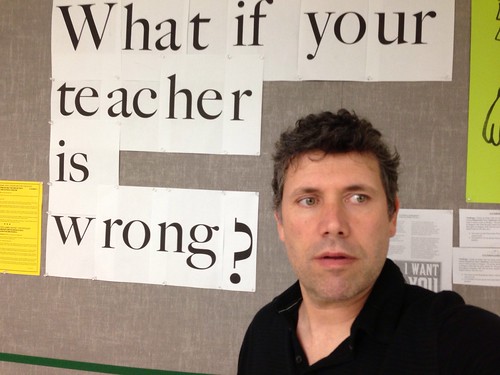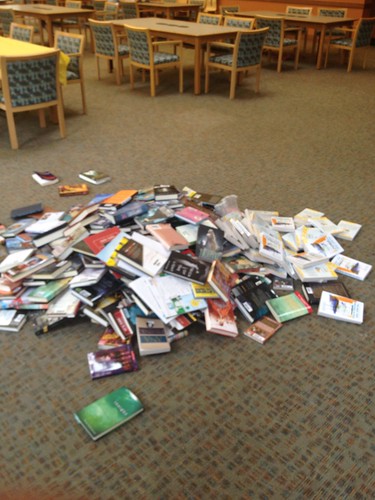
Digital Is Crash and Burn
So here’s what happened: my class, “Teaching Reading,” was using Digital Is as a space for online discussion. I’ve reiterated in this class that I value the sense of public discussion. I am appreciative of the ways Digital Is brings my preservice students into the same digital space as the career teachers I continue to learn from. I value the notion that our dialogue is one that other teachers can infringe upon with new insight and ideas. Of course something something the best laid plans blah blah blah Digital Is moved to a new layout and my discussion system went bust-o.
And so my mid-semester quandary was one of deciding if I should lock up our discussion behind some closed online site elsewhere or find a new digital, public space for dialogue. I chose the egotistical route and moved the rest of the semester’s dialogue here, on my own blog. Each week, you’ll see a rambling post where I detail what I am struggling with in the class and where I pose a few questions for my students (who are obligated to respond – hi class!). Feel free to jump into the dialogue with them!
Vulnerable Wobbling
My colleague Cindy and I have been thinking a lot lately about growth, struggle, and identity. We are working from a model called Pose/Wobble/Flow, which you can read a bit more about over here.
One thing I’ve been wobbling with lately is confronting vulnerability and uncertainty within the classroom. My friend & mentor Travis instilled in me the value of articulating to students that it’s okay if teachers don’t know everything. See:

On Thursday, a group of students in the class led us through a writing exercise where we adapted a favorite poem or song. I chose this classic:
I was thrown for a loop when trying to adapt this at first – I think John Darnielle (aka the Mountain Goats) spins great portraits and vignettes. I like the concise way he turns a funny sounding title and opening verse into an impassioned condemnation of authority. Obviously, my adaptation has to do with this rapscallion:

The best ever dog in Fort Collins
The best ever dog in Fort Collins
was a small mutt that’d been digging holes since the summer.
Her name was Olive or Olivia Agadorus Garcia
and she walked ’round the lake every day.
The best ever dog in Fort Collins,
never actually caught a cat
but the most grisly kills – after weeks of practice
were a bird, and a rabbit, and another rabbit without a leg.
Olive believed in her heart that she was destined for hunting greatness.
So in the backyard she made prominent use of the running space
and prepared for her eventual takeover and escape.
This was how she got out
and how the fence was rebuilt to make it taller
and why her howls of frustration ring out in the night
and why she made plans to get even.
When you punish a canine for dreaming her dream
don’t expect her to thank or forgive you.
The best ever dog in Fort Collins
will in time both out-jump and outsmart you.
Hail Satan!
Hail Satan tonight!
Hail Satan!
Hail hail!
Yeah, I know that whole last “hail Satan” part came from the original … but if you’d met Olive you’d be cool with it.
In any case, I remember writing not-so-light-hearted poetry during the annual unit plan when I was a student many a year ago. I remember when it came to the “who wants to share” part of the class feeling the terrible top-of-the-rollercoaster mixture of fear and excitement about sharing my work. A part of me really wanted to. A part of me was firmly dead set against it.
And so, thinking about the young me, I am wobbling with: how do I get students to move beyond feelings of vulnerability within my classroom? There are strong voices in both of my classes and there are those that are often missing. Particularly within the context of teaching reading, how can I support students who may be feeling more dependent–wanting more models for teaching & curriculum development (as examples of dependent reading within the context of an upper division course)?
Likewise, there are lots of reasons for feelings of vulnerability to manifest within a classroom. Some come from being afraid of not knowing what the teacher or professor wants. Some from not knowing what your peers expect and feeling out of place. I realize I can be both intentionally and unintentionally vague in my class and in my expectations of the work I would like students to turn in; this creates vulnerability. What if you do the assignment wrong?* Part of limiting vulnerability can be seen as increased efforts of clearly articulating goals. But part of this, too, is guiding students to understand that they–as much as the teacher–can define what is correct or incorrect, when to share and when to remain silent, when to–as our course norms dictate–“step forward and step back.”
Anyways, that’s what I’m wobbling with. I am asking my students–in the comments below–to explain what they are wobbling with this week, or to respond to my own wobbling above.
* “doing it wrong” is a socially constructed conceit and one I think about with regards to technology often.









